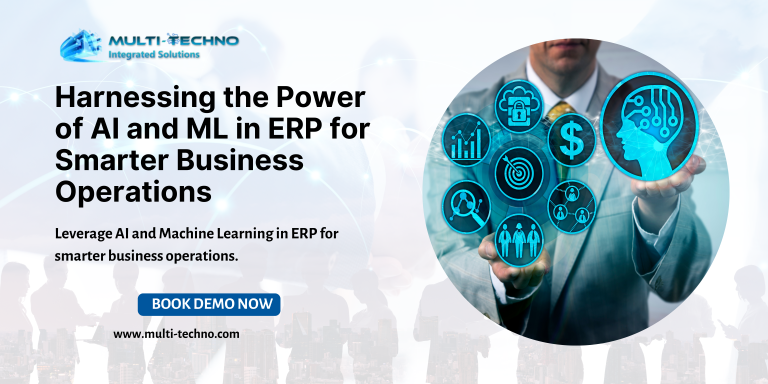Multi-Techno Integrated Solution

Table of Contents
ToggleUnlocking Business Efficiency: The Role of AI and ML in ERP Systems
In today’s digital era, businesses face increasing pressure to streamline operations, enhance productivity, and make data-driven decisions. Enterprise Resource Planning (ERP) Systems have long been instrumental in integrating various business functions. However, the advent of Artificial Intelligence (AI) and Machine Learning (ML) has introduced a new dimension to ERP, enabling businesses to harness the power of intelligent automation and predictive analytics. This article explores the benefits of AI and ML in ERP systems and how they can drive smarter business operations.
Understanding AI and ML in ERP
AI refers to the ability of machines to perform tasks that typically require human intelligence. ML, a subset of AI, enables machines to learn from data and improve performance without explicit programming. When integrated into ERP systems, AI and ML technologies empower businesses to automate repetitive tasks, extract insights from vast amounts of data, and make intelligent predictions.
Intelligent Automation and Efficiency
AI and ML in ERP bring intelligent automation to business processes, minimizing manual efforts and improving operational efficiency. With AI-powered bots, routine tasks such as data entry, report generation, and invoice processing can be automated, freeing up employees’ time for more value-added activities. This streamlines operations reduces errors, and enhances productivity across the organization.
Predictive Analytics and Insights
AI and ML algorithms can analyze vast volumes of data within ERP systems, uncover patterns, and generate valuable insights. By leveraging historical data, these technologies enable businesses to make accurate predictions and data-driven decisions. For example, ML algorithms can analyze sales trends, customer behavior, and market data to forecast demand, optimize inventory levels, and plan production schedules. This empowers businesses to proactively respond to market dynamics and make informed decisions for improved profitability.
Enhanced Customer Experience
AI and ML in ERP systems contribute to delivering a superior customer experience. By leveraging AI technologies, businesses can analyze customer data, preferences, and behavior to personalize interactions, recommend products, and offer tailored promotions. ML algorithms can also enable sentiment analysis of customer feedback, helping organizations understand customer satisfaction levels and address concerns promptly. This level of personalization and responsiveness enhances customer satisfaction, fosters loyalty, and drives business growth.
Intelligent Supply Chain Management
The integration of AI and ML in ERP revolutionizes supply chain management by optimizing processes and increasing visibility. AI-powered algorithms can analyze historical and real-time data to forecast demand, optimize inventory levels, and automate replenishment. ML models can identify patterns and anomalies in supply chain data, enabling businesses to proactively mitigate risks and optimize logistics operations. This results in reduced lead times, better inventory management, and improved supplier collaboration.
Fraud Detection and Risk Management
AI and ML in ERP systems bolster fraud detection and risk management capabilities. These technologies can analyze financial transactions, employee behavior, and historical patterns to identify anomalies and potential fraudulent activities. By leveraging ML algorithms, businesses can detect suspicious patterns and behaviors in real-time, preventing financial losses and safeguarding organizational assets. This advanced level of risk management enhances the security and integrity of business operations.
Smart Decision-Making with Intelligent Insights
AI and ML technologies provide intelligent insights that empower decision-makers at all levels of the organization. With advanced analytics capabilities, ERP systems can generate visualizations, reports, and dashboards that highlight key performance indicators, trends, and anomalies. These insights enable stakeholders to make data-driven decisions, identify areas for improvement, and seize growth opportunities. By democratizing access to intelligent insights, AI and ML transform decision-making processes and drive organizational success.
Continuous Improvement and Adaptability
AI and ML in ERP systems enable continuous improvement and adaptability to changing business environments. ML algorithms can analyze data from ERP systems to identify process inefficiencies, bottlenecks, or areas of improvement. This enables businesses to optimize processes, automate tasks, and enhance operational performance over time. Additionally, AI technologies can adapt to changing data patterns and market conditions, ensuring that ERP systems remain relevant and effective in dynamic business landscapes.
Conclusion
Integrating AI and ML capabilities into ERP systems unlocks significant potential for smarter business operations. From intelligent automation and predictive analytics to enhanced customer experiences and improved supply chain management, AI and ML empower businesses to optimize processes, make data-driven decisions, and stay ahead of the competition. Embracing the power of AI and ML in ERP is a strategic move that enables organizations to unlock new levels of efficiency, innovation, and success in the digital age.
About Us
ERP software and systems are designed and implemented by Multi-Techno, a registered company. By combining data from financials, sales, CRM, inventories, and operations, businesses can increase productivity, make better decisions, and increase profitability with the aid of our ERP System, a single, integrated software platform.
Quick Links
Contact Us
Office # 100, 101 Second Floor Kohinoor 1, Faisalabad, Pakistan
